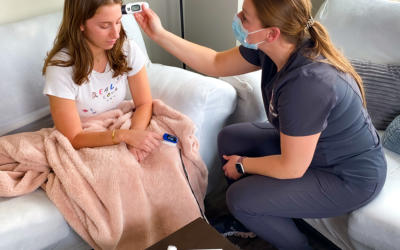When should I go to the emergency room for back pain?
Almost everyone experiences back pain at some point. It is one of the most common reasons why people miss work, and a leading cause of disability around the world. Back pain can interfere with daily tasks and become chronic. Most of the time, new back pain is related to a self-limiting condition like a muscle or ligament strain or a mild flare-up of arthritis. But occasionally, new back pain is related to more serious underlying issues. Patients often need guidance to identify these more serious underlying causes of back pain.
What does back pain feel like?
Back pain can occur in the lower, middle, or upper back. Lower back pain is the most common. It can be constant or only occur with certain movements or activities. It may feel like any of the following:
- Muscle soreness
- Stabbing pain
- Burning pain
- Pain that moves or radiates — down your legs or up your neck, for example
- Stiffness
What causes back pain?
Many factors can cause back pain, including:
- Straining muscles or ligaments: This is the most common cause of back pain. Straining is more likely when you have poor posture, attempt new activities, or ‘overdo it’ with exercise or chores.
- Disk injuries: Disks serve as the padding between the vertebrae in your spine. When injured, they can rupture or bulge. Bulged or ruptured disks can rest on a nerve and cause pain.
- Arthritis: Joints in your back can become swollen and cause pain. Sometimes spinal arthritis can restrict space in the spinal column and cause stenosis, which puts pressure on your spinal cord and causes pain.
- Osteoporosis: Low bone density causes the bones to weaken, and can lead to painful fractures in the spine.
- Infections: Infection of the spine, kidney or bladder, or pelvic inflammatory disease can lead to back pain.
- Abnormal curvature of the spine
For example, scoliosis
- Tumors of the spine: Both cancerous and non-cancerous tumors can grow on or near the spine and cause pain.
How can you treat back pain at home?
- Take over-the-counter pain medication, such as acetaminophen for pain or non-steroidal anti-inflammatories (NSAIDs, such as ibuprofen) for pain and inflammation.
- Refrain from strenuous activities.
Smaller movements like standing or walking can help reduce and prevent stiffness.
- Apply heat or ice in 20-minute increments to ease pain.
- Try a basic, gentle back stretch.
Lie on the floor with your knees bent for several minutes. Then gently lift both knees toward your chest and hold for 10 seconds. Repeat this motion 3-5 times.
When should you seek emergency or urgent care for back pain?
You should seek medical attention if you have new back pain (starting in the last few weeks), AND
- You experience numbness or tingling in the arms, legs, or “saddle area”.
- Your pain is extreme and doesn’t get better with rest or over-the-counter medications.
- Your pain is caused by a recent injury, especially related to a fall or a car accident.
- You have unexplained weight loss.
- You experience weakness in the arms or legs.
- You have a fever — your pain could indicate an infection.
- You have new loss of bladder or bowel control (accidentally wetting or soiling yourself).
How will your ER or urgent care clinician diagnose your back pain?
- Physical Exam: Your provider will see how well you can sit, stand, walk and lift your legs and assess the location, quality, and severity of your pain.
- Imaging: An X-ray will show the bony structures in your back. An MRI or CT Scan can show problems with disks or soft tissues, such as muscles and ligaments.
How will your ER or urgent care clinician treat your back pain?
Your provider may do the following to ease your symptoms:
- Refer you to physical therapy, where you can benefit from exercises and healing therapies such as ultrasound.
- Prescribe medication, such as narcotics/opioids or muscle relaxants.
Muscle relaxants can make you sleepy and narcotics/opioids have addictive properties. As a result, neither are good long-term solutions for back pain.
- Refer you to an orthopedic specialist: An orthopedist may recommend treatment such as steroid injections or surgery.
How can you prevent back pain?
There are measures you can take to prevent back pain. They include:
- Maintain a healthy weight: Carrying extra weight puts stress on your joints and your back.
- Consume sufficient levels of calcium and vitamin D: Both are necessary for bone health.
- Maintain a neutral position and ‘good posture’ while sitting and standing: Keep your hips, neck, and head in line with your spine.
- Lift objects safely.
Use your leg muscles to lift, NOT your back. Never lift objects while twisting your back.
- Exercise! Regular cardio activity helps maintain a healthy body weight. Both flexibility and core strengthening exercises specifically help maintain a healthy back.
- Wear supportive footwear: Avoid high heels, which put strain on your back, and flip-flops, which can cause falls.
Fast, convenient help from Pivotal Health for back pain
If you’re experiencing back pain, connect with Pivotal Health to discuss your potential treatment options based on your symptoms. Our experienced triage support and clinicians will help you determine if you need emergency care or can be seen in the comfort of your home, on your own schedule, by a licensed Pivotal Health provider.
Pivotal Health clinicians can assess your back pain and create a treatment plan for you. If appropriate, we can arrange for x-rays to be performed right at home, with results read by the Pivotal Health provider as well as a radiologist. If more advanced imaging, like a CT or MRI, is needed, we’ll help you get to that next level of care.
To treat your pain, your provider will create a personalized treatment plan. This plan will include the most appropriate non-medical options like stretches, exercises, heat/cold therapy, massage, physical therapy and acupuncture. This plan will also include the most appropriate medication options like over-the-counter meds, prescription meds like muscle relaxants or gabapentin, and, if desired, injectable medications like ketorolac right at the visit.
IMPORTANT NOTE: As a company policy, Pivotal Health providers do not prescribe or administer narcotic/opioid medications like hydrocodone, oxycodone or morphine. This is for the safety of both our providers and our patients.
Finally, all Pivotal Health visits include follow-up consultation to ensure you’re on the road to recovery. If your back pain is not improving or if a more serious underlying cause is suspected, we will assist you in getting to the most appropriate next level of care.












